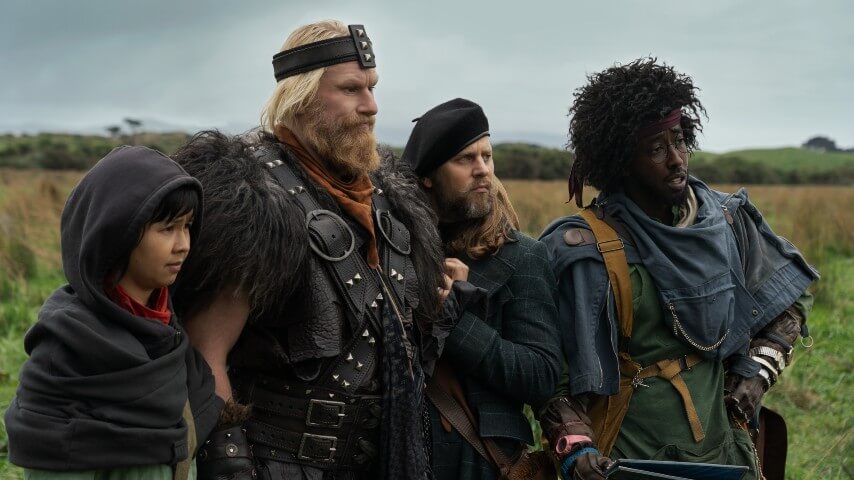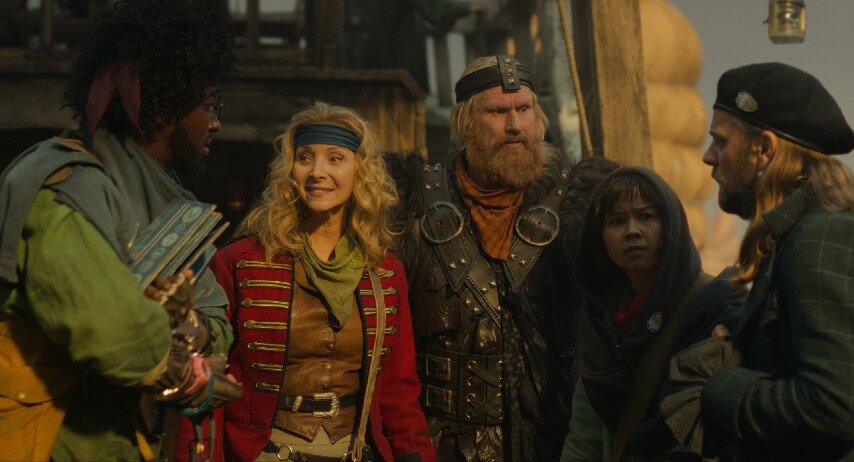Time Bandits' premiere packs in way more jokes than the original film
“You have to stick with the stupid thieves because you are going to save the universe”
Charlyne Yi, Rune Temte, Tadhg Murphy, and Roger Jean Nsengiyumva in Time Bandits (Photo: Apple TV+)
Let’s get this out of the way: I’m not nostalgic for the original Time Bandits. I made the same mistake as its financiers, beloved Beatle George Harrison and his business partner Denis O’Brien, in thinking of it as a Monty Python film simply because three of those guys are involved. Though Terry Gilliam conceptualized and directed it, Michael Palin co-wrote it and does a few short bits with Shelly Duval, and John Cleese shows up as Robin Hood, it would be a mistake to think of this film as spiritually akin to The Holy Grail or Life Of Brian. It’s just not as funny. And Gilliam was apparently such a pain in the ass to work with on Time Bandits that the lyrics to the single song Harrison contributed to the soundtrack slyly calls him out for his sbehavior (“all you owe is apologies,” etc.). The show, on the other hand, helmed by Taika Waititi, Iain Morris, and Jemaine Clement, brings the laughs I had expected from Palin & Co., addresses some narrative inconsistencies, and comes with a great cast.
In this first episode, we’re introduced to Kevin Haddock, an 11-year-old boy presented as the dork of all dorks. No one in his life has any patience for his lengthy info-dumps about ancient civilizations and leaders of the past, least of all his sister Saffron and his own mom and dad (a consultant at an accountancy firm and accountant at a consultancy firm, respectively). They’re into their own little gadgets, especially their phones, and openly make fun of Woodhenge, a neolithic precursor to Stonehenge, when they go there as a family to celebrate the boy’s birthday. His mean-spirited folks get in some kind-of-funny zingers during their time onscreen, and their delivery is sharp, quick, and playful. But their main narrative purpose, we know, is to provide a contrast between a world where Kevin’s interest in history is unappreciated and actively discouraged and the new one unfolding where it’s vital.
That new world comes to him through his wardrobe, Narnia-style, first with an unintelligible Viking on the run from murderous Saxons, next with the Time Bandits themselves walking through it and creeping around in his bedroom. Their leader Penelope (a perfectly deadpan Lisa Kudrow) explains that his room itself, not just the wardrobe, is a “time egress,” a portal from which the team can access any time period just by pushing some walls around. It’s a dream come true for our little history buff, and when the Supreme Being (a blue, glowing, three-faced head) comes through the wardrobe in pursuit of the Bandits who have stolen his map, our guy gets to flee with them.
The team falls directly onto an ancient Chinese ship among British and Portuguese vessels. Kevin clocks the time period as 1810 Macau, with famed pirate Madame Zheng (a.k.a. Zheng Yi Sao) holding her legendary standoff against rival armies. Whether or not all the details of this exchange are completely accurate (and a quick Wikipedia search reveals that they may at the very least have the date wrong), this sequence serves as a key test of Kevin’s character and knowledge. He flatters Madame Cheng and affirms her strategy by letting her know what his history books have told him: that it will work. This changes how the Bandits see him as well, and influences them to keep him on a bit longer. When Madame Zheng suggests he stay with her as her soothsayer, Penelope, with a glint in her eye, declines: “He says our sooths.”
Notice that this Macau interaction draws our focus to the team’s use of “translation hats,” a welcome change from the Time Bandits film in which no language barrier seems to ever exist, even as the men engage with figures as disparate culturally as Napoleon and Agamemnon. Be it a babelfish as in The Hitchhikers Guide to the Galaxy, a contact lens/earbud pairing to translate ASL in Marvel’s Echo, or even just a wave of a wand and a spell, any device is better than no device to explain how characters across time and culture can speak so smoothly. It calls to mind the episode of What We Do In The Shadows in which Nandor the Relentless can’t communicate with his pre-vampire self because he has forgotten his native language in the hundreds of years since he last spent time in his homeland. Now that we’ve entered a media landscape in which these discrepancies are acknowledged, we can’t really go back, and it’s refreshing that TB continues this trend.

Roger Jean Nsengiyumva, Lisa Kudrow, Rune Temte, Charlyne Yi, and Tadhg Murphy in Time Bandits (Photo: Apple TV+)
Anyway. Continuing on, the Bandits crash land in a field where a team is hard at work building Stonehenge. This is the most Pythonesque scene of the entire episode, as Kevin excitedly asks the primeval foreman about each theory people have posited concerning the monument’s use. Was it utilized for sacrifices? Rituals? Weddings? The guy responds to each one with, “Yeah, could be,” and also lists off previous attempts at a Stonehenge type structure for the young fan, including pebble-henge and people-henge, which consisted of the crew on the job site standing around with their arms raised. Ultimately, Kevin notices the gift shop off to the side featuring mini-Stonehenges for purchase, and he’s jaded by the blatantly capitalistic nature of the place. It’s like his consumerist dad was right: Only the merch matters.
Upon nightfall, the characters gather around an open fire for a meal (and some exposition). Penelope introduces each member of the team with their name and special quality they offer the collective. It’s clever and gives each part of the ensemble a chance to briefly shine. Hilariously, Bitteleg, a man said to have the strength of maybe…seven men (they aren’t sure) offers Kevin “a special double bowl” from which to eat his food. “This is a dog bowl,” Kevin responds immediately. Perhaps he will prove his worthiness to the team in time, but from this scene it’s clear that he’s not especially respected in the Bandits’ company yet.
Following a brief fireside respite, they’re off to Troy to steal a horse—yes, the Trojan Horse. The Bandits are welcomed inside the big pony by the proud Greeks who constructed it, before the Trojan guards decide that it’s too suspicious and light it ablaze. Lucky for them, the guards’ higher-up intervenes, has them extinguish their fire, and welcomes the big wooden horsey with “beautiful eyes” into the compound. While the Bandits go off banditing (each taking a vase, it turns out), Kevin has a conversation with Cassandra, a woman cursed to see the future, but no one believes her. She tells him, “You have to stick with the stupid thieves because you are going to save the universe.” All the while, Pure Evil (Jemaine Clement, having a blast) has sent his minion Fianna to pursue the bumbling crew and steal back the map they stole from the Supreme Being, so saving said universe may be a bit tricky
Stray observations
- • Charlene Yi is a welcome presence in this, though apparently they didn’t have the best time.
- • Damn. Kevin’s parents’ preoccupations with their smart lighting is relatable. Having pretty, colorful lights in my house that I can set on a whim is one of my main sources of joy.
- • The scenes with Jemaine Clement as Pure Evil are another clear upgrade, in both casting and vibe, from the original film. Whereas the film had a sort of techy apocalyptic bunker vibe to Pure Evil’s lair, Clement’s looks a little more like that demon’s pad at the beginning of Thor: Ragnarok. It’s just better.
- • There are some fun little Python nods in this episode. Tonally, the Stonehenge scene feels a bit like Michael Palin’s disgruntled anarchist peasant in The Holy Grail, and the inclusion of the Trojan Horse calls to mind the Trojan Rabbit from that same film. More directly, though, Widget, the guy who holds onto the map, laments, “I didn’t leave my cushy job at the shrubbery department to chop up horses.” Roger the Shrubber, anyone?
- • I already like the historical/mythological events and people they’re bringing into this show much better than the few included in the Gilliam film. They had all European dudes. These are more broadly sourced and more interesting.
- • It’s nice to have a list of things to expect in a show, especially in family-friendly fare as it gives parents some fun things to wonder about with the kids. Cassandra gives us that very element. When are they going to jump off the cliff? Also, how and why?
- • It’s always great to highlight the range on Rachel House. She plays the creepy Fianna in this, but you know who else she has played? Moana’s grandma!
- • I do have a lot of questions for this show so far. How are we just traveling to historical places Kevin knows about? Are we to believe he’s just so well-versed in history that he knows everything, or are the time periods and locations they choose somehow governed by the kid’s subconscious?